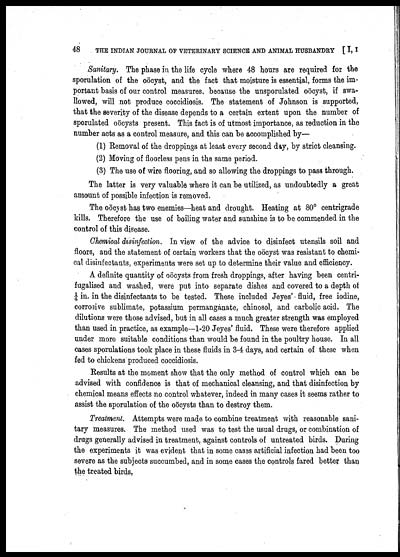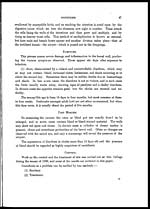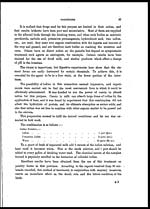Medicine - Veterinary > Veterinary colleges and laboratories > Indian journal of veterinary science and animal husbandry > Volume 1, 1931 > Part I (March 1931) > Coccidiosis
(82) Page 48
Download files
Individual page:
Thumbnail gallery: Grid view | List view

48 THE INDIAN JOURNAL OF VETERINARY SCIENCE AND ANIMAL HUSBANDRY [ I, I
Sanitary. The phase in the life cycle where 48 hours are required for the
sporulation of the oöcyst, and the fact that moisture is essential, forms the im-
portant basis of our control measures, because the unsporulated oöcyst, if swa-
llowed, will not produce coccidiosis. The statement of Johnson is supported,
that the severity of the disease depends to a certain extent upon the number of
sporulated oöcysts present. This fact is of utmost importance, as reduction in the
number acts as a control measure, and this can be accomplished by—
(1) Removal of the droppings at least every second day, by strict cleansing.
(2) Moving of floorless pens in the same period.
(3) The use of wire flooring, and so allowing the droppings to pass through.
The latter is very valuable where it can be utilized, as undoubtedly a great
amount of possible infection is removed.
The oöcyst has two enemies—heat and drought. Heating at 80° centrigrade
kills. Therefore the use of boiling water and sunshine is to be commended in the
control of this disease.
Chemical disinfection. In view of the advice to disinfect utensils soil and
floors, and the statement of certain workers that the oöcyst was resistant to chemi-
cal disinfectants, experiments were set up to determine their value and efficiency.
A definite quantity of oöcysts from fresh droppings, after having been centri-
fugalised and washed, were put into separate dishes and covered to a depth of
¼ in. in the disinfectants to be tested. These included Jeyes' fluid, free iodine,
corrosive sublimate, potassium permanganate, chinosol, and carbolic acid. The
dilutions were those advised, but in all cases a much greater strength was employed
than used in practice, as example—1-20 Jeyes' fluid. These were therefore applied
under more suitable conditions than would be found in the poultry house. In all
cases sporulations took place in these fluids in 3-4 days, and certain of these when
fed to chickens produced coccidiosis.
Results at the moment show that the only method of control which can be
advised with confidence is that of mechanical cleansing, and that disinfection by
chemical means effects no control whatever, indeed in many cases it seems rather to
assist the sporulation of the oöcysts than to destroy them.
Treatment. Attempts were made to combine treatment with reasonable sani-
tary measures. The method used was to test the usual drugs, or combination of
drugs generally advised in treatment, against controls of untreated birds. During
the experiments it was evident that in some cases artificial infection had been too
severe as the subjects succumbed, and in some cases the controls fared better than
the treated birds.
Set display mode to: Large image | Zoom image | Transcription
Images and transcriptions on this page, including medium image downloads, may be used under the Creative Commons Attribution 4.0 International Licence unless otherwise stated. ![]()
| Permanent URL | https://digital.nls.uk/75226040 |
|---|
| Description | Covers articles from 1931. |
|---|




